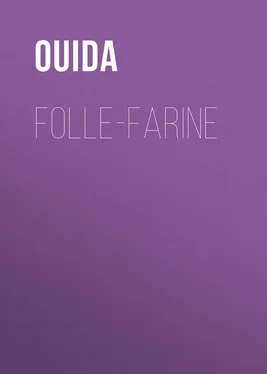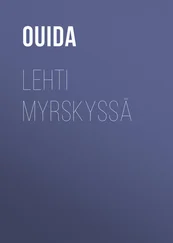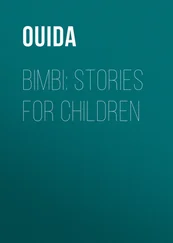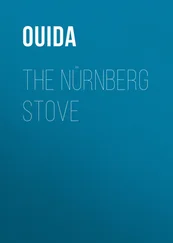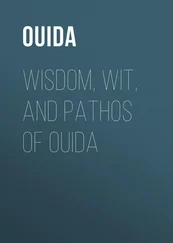Ouida - Folle-Farine
Здесь есть возможность читать онлайн «Ouida - Folle-Farine» — ознакомительный отрывок электронной книги совершенно бесплатно, а после прочтения отрывка купить полную версию. В некоторых случаях можно слушать аудио, скачать через торрент в формате fb2 и присутствует краткое содержание. Жанр: foreign_prose, literature_19, foreign_antique, на английском языке. Описание произведения, (предисловие) а так же отзывы посетителей доступны на портале библиотеки ЛибКат.
- Название:Folle-Farine
- Автор:
- Жанр:
- Год:неизвестен
- ISBN:нет данных
- Рейтинг книги:5 / 5. Голосов: 1
-
Избранное:Добавить в избранное
- Отзывы:
-
Ваша оценка:
- 100
- 1
- 2
- 3
- 4
- 5
Folle-Farine: краткое содержание, описание и аннотация
Предлагаем к чтению аннотацию, описание, краткое содержание или предисловие (зависит от того, что написал сам автор книги «Folle-Farine»). Если вы не нашли необходимую информацию о книге — напишите в комментариях, мы постараемся отыскать её.
Folle-Farine — читать онлайн ознакомительный отрывок
Ниже представлен текст книги, разбитый по страницам. Система сохранения места последней прочитанной страницы, позволяет с удобством читать онлайн бесплатно книгу «Folle-Farine», без необходимости каждый раз заново искать на чём Вы остановились. Поставьте закладку, и сможете в любой момент перейти на страницу, на которой закончили чтение.
Интервал:
Закладка:
"But all shun me, as even the wasp shuns the bitter oak apple," she said, slowly and dreamily; "who should love me, even as the wasp loves the peach?"
Marcellin smiled his grim and shadowy smile. He made answer,—
"Wait!"
She sat mute once more, revolving this strange, brief word in her thoughts—strange to her, with a promise as vague, as splendid, and as incomprehensible as the prophecy of empire to a slave.
"The future?" she said, at last. "That means something that one has not, and that is to come—is it so?"
"Something that one never has, and that never comes," muttered the old man, wearily cracking the flints in two; "something that one possesses in one's sleep, and that is farther off each time that one awakes; and yet a thing that one sees always—sees even when one lies a-dying, they say—for men are fools."
Folle-Farine listened, musing, with her hands clasped on the handle of her empty basket, and her chin resting upon them, and her eyes watching a maimed butterfly drag its wings of emerald and diamond through the hot, pale, sickly dust.
"I dream!" she said, suddenly, as she stooped and lifted the wounded insect gently on to the edge of a leaf. "But I dream wide awake."
Marcellin smiled.
"Never say so. They will think you mad. That is only what foolish things, called poets, do."
"What is a poet?"
"A foolish thing, I tell you—mad enough to believe that men will care to strain their eyes, as he strains his, to see the face of a God who never looks and never listens."
"Ah!"
She was so accustomed to be told that all she did was unlike to others, and was either wicked or was senseless, that she saw nothing except the simple statement of a fact in the rebuke which he had given her. She sat quiet, gazing down into the thick white dust of the road, bestirred by the many feet of mules and men that had trodden through it since the dawn.
"I dream beautiful things," she pursued, slowly. "In the moonlight most often. I seem to remember, when I dream—so much! so much!"
"Remember—what should you remember? You were but a baby when they brought you hither."
"So they say. But I might live before, in my father's kingdom—in the devil's kingdom. Why not?"
Why not, indeed! Perhaps we all lived there once; and that is why we all through all our lives hanker to get back to it.
"I ask him so often to take me back, but he does not seem ever to hear."
"Chut! He will hear in his own good time. The devil never passes by a woman."
"A woman!" she repeated. The word seemed to have no likeness and no fitness with herself.
A woman!—she!—a creature made to be beaten, and sworn at, and shunned, and loaded like a mule, and driven like a bullock!
"Look you," said the old man, resting his hammer for a moment, and wiping the sweat from his brow, "I have lived in this vile place forty years. I remember the woman that they say bore you—Reine Flamma. She was a beautiful woman, and pure as snow, and noble, and innocent. She wearied God incessantly. I have seen her stretched for hours at the foot of that cross. She was wretched; and she entreated her God to take away her monotonous misery, and to give her some life new and fair. But God never answered. He left her to herself. It was the devil that heard—and replied."
"Then, is the devil juster than their God?"
Marcellin leaned his hammer on his knees and his voice rose clear and strong as it had done of yore from the Tribune.
"He looks so, at the least. It is his wisdom, and that is why his following is so large. Nay, I say, when God is deaf the devil listens. That is his wisdom, see you. So often the poor little weak human soul, striving to find the right way, cries feebly for help, and none answer. The poor little weak soul is blind and astray in the busy streets of the world. It lifts its voice, but its voice is so young and so feeble, like the pipe of a newly-born bird in the dawn, that it is drowned in the shouts and the manifold sounds of those hard, crowded, cruel streets, where every one is for himself, and no man has ears for his neighbor. It is hungered, it is athirst, it is sorrowful, it is blinded, it is perplexed, it is afraid. It cries often, but God and man leave it to itself. Then the devil, who harkens always, and who, though all the trumpets blowing their brazen music in the streets bray in his honor, yet is too wise to lose even the slightest sound of any in distress—since of such are the largest sheaves of his harvest—comes to the little soul, and teaches it with tenderness, and guides it towards the paths of gladness, and fills its lips with the bread of sweet passions, and its nostrils with the savor of fair vanities, and blows in its ear the empty breath of men's lungs, till that sickly wind seems divinest music. Then is the little soul dazzled and captured, and made the devil's for evermore; half through its innocence, half through its weakness; but chiefly of all because God and man would not hear its cries whilst yet it was sinless and only astray."
He ceased, and the strokes of his hammer rang again on the sharp flint stones.
She had listened with her lips parted breathlessly, and her nightlike eyes dilated.
In the far distant time, when he had been amidst the world of men, he had known how to utter the words that burned, and charm to stillness a raging multitude. He had not altogether lost this power, at such rare times as he still cared to break his silence, and to unfold the unforgotten memories of a life long dead. He would speak thus to her, but to no other.
Folle-Farine listened, mute and breathless, her great eyes uplifted to the sun, where it was sinking westward through a pomp of golden and of purple cloud. He was the only creature who ever spoke to her as though she likewise were human, and she followed his words with dumb unquestioning faith, as a dog its master's footsteps.
"The soul! What is the soul?" she muttered, at length.
He caught in his hand the beautiful diamond-winged butterfly, which now, freed of the dust and drinking in the sunlight, was poised on a foxglove in the hedge near him, and held it against the light.
"What is it that moves this creature's wings, and glances in its eyes, and gives it delight in the summer's warmth, in the orchid's honey, and in the lime-tree's leaves? I do not know; but I know that I can kill it—with one grind of my heel. So much we know of the soul—no more."
She freed it from his hand.
"Whoever made it, then, was cruel. If he could give it so much power, why not have given it a little more, so that it could escape you always?"
"You ask what men have asked ten times ten thousand years—since the world began—without an answer. Because the law of all creation is cruelty, I suppose; because the dust of death is always the breath of life. The great man, dead, changes to a million worms, and lives again in the juices of the grass above his grave. It matters little. The worms destroy; the grasses nourish. Few great men do more than the first, or do as much as the last."
"But get you homeward," he continued, breaking off his parable; "it is two hours past noon, and if you be late on the way you pay for it with your body. Begone."
She nodded her head, and went; he seldom used gentle words to her, and yet she knew, in a vague way, that he cared for her; moreover, she rejoiced in that bitter, caustic contempt in which he, the oldest man amidst them, held all men.
His words were the only thing that had aroused her dulled brain to its natural faculties; in a manner, from him she had caught something of knowledge—something, too, of intellect; he alone prevented her from sinking to that absolute unquestioning despair which surely ends in idiocy or in self-murder.
She pursued her way in silence across the fields, and along the straight white road, and across a wooden bridge that spanned the river, to her home.
Читать дальшеИнтервал:
Закладка:
Похожие книги на «Folle-Farine»
Представляем Вашему вниманию похожие книги на «Folle-Farine» списком для выбора. Мы отобрали схожую по названию и смыслу литературу в надежде предоставить читателям больше вариантов отыскать новые, интересные, ещё непрочитанные произведения.
Обсуждение, отзывы о книге «Folle-Farine» и просто собственные мнения читателей. Оставьте ваши комментарии, напишите, что Вы думаете о произведении, его смысле или главных героях. Укажите что конкретно понравилось, а что нет, и почему Вы так считаете.
